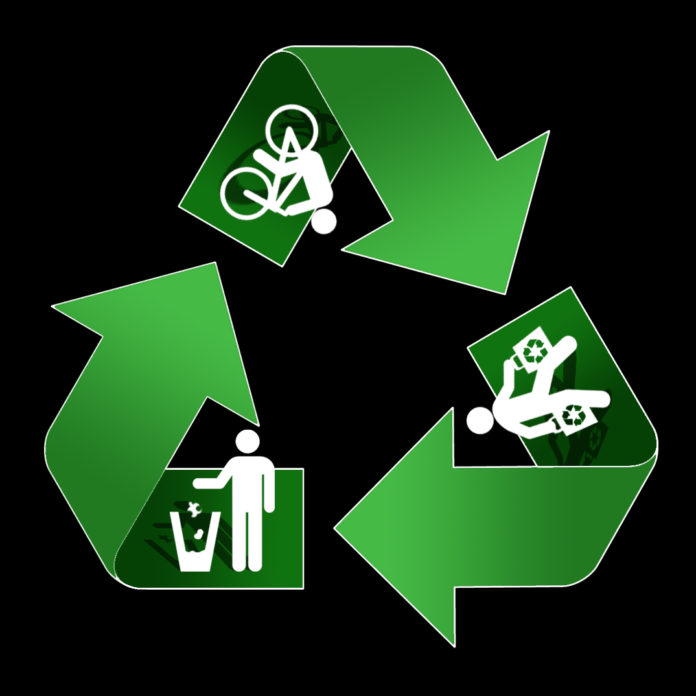Ever since Starbucks announced plans in July to remove plastic straws from all of its stores, the company’s actions have reverberated throughout the United States. For example, Baylor dining halls will no longer offer plastic straws to students. This effort is in part prompted by student interest in sustainability and in part by Aramark’s move towards eliminating some of its plastic waste. Other global corporations and even some state governments have considered banning straws.
Of course, any conversation or action regarding sustainability benefits the environment, and It’s better to move towards plastic elimination in small steps than to do nothing at all. However, sustainability is about more than straws.
Plastic, even the kind that can often be recycled or avoided altogether, fills up our landfills at alarming rates. The Great Pacific Garbage Patch, located in the Pacific Ocean, is larger than Texas. This waste cannot biodegrade in landfills or oceans – or anywhere for that matter. During the International Coast Cleanup, straws were among the top 5 most common items found, but what about the other types of trash discovered?
The International Coast Cleanup reported plastic cigarette butts, food wrappers, plastic beverage bottles and plastic bottle caps as the most common items found in the ocean in addition to plastic straws. All of these items have one critical characteristic in common: They are single-use plastic products.
Plastic is damaging the environment because of its temporal and disposable nature. We only use straws, cigarettes, food wrappers and water bottles once before throwing them into the trash can, which will eventually be thrown in a landfill or find its way to the ocean. Limiting use of these products doesn’t have to be a corporate action. We, as consumers, can opt to use paper or reusable straws, not smoke, clean out and recycle food wrappers and water bottles and switch to reusable water bottles.
Reusable products like glass containers, water bottles, grocery bags and straws help you get your money’s worth for items that are usually used once and then disposed.
We need to take a more holistic look at sustainability. There is no one all-encompassing remedy for the environmental damage humans have inflicted on the planet. That doesn’t mean we shouldn’t aim to practice sustainable lifestyles. Straws are just one piece of the puzzle. In fact, single-use disposable plastic products are also just one —albeit larger — piece of the puzzle.
Holistic sustainability means keeping the long-term well-being of the environment in mind as often as possible. That means limiting use of plastic, recycling waste when you can, composting organic waste and consuming environmentally-friendly products when possible. Most cleaning products contain harsh chemicals, but alternatives are available in most stores, including HEB through brands like Mrs. Meyer’s. Clothes at major brands are often produced in ways that harm both the environment and low-wage workers. Thrift stores offer a more sustainable and affordable alternative. We can save up for eco-friendly hybrid vehicles, ride our bikes more and utilize public transportation.
Straws maybe all the buzz, and the international focus on this small aspect of sustainability could be limiting conversations about holistic sustainability. In fact, even Baylor’s initiatives to reduce its plastic footprint through dining halls have been covered by the media in a limited way. Even the Lariat’s own story about the changes emphasized the banning of straws instead of focusing on the larger changes including “increasing procurement of local, seasonal and responsibly sourced products, reducing, reusing and recycling food and other waste, conserving energy and water and providing healthy environments, reducing fuel consumption and minimizing emissions,” according to the Aramark Green Thread Environmental Sustainability Platform.
The Lariat article only mentioned some of these additional changes to the sustainability practices of the dining halls at the end of the article. As journalists, we need to take more responsibility for our role in sensationalizing certain issues at the expense of attention on other, more pressing issues. This sends the message to corporations that could have more sustainable practices that they can please consumers by simply banning straws rather than taking steps toward more all-encompassing environment-friendly behaviors.
In addition, as consumers, we need to take responsibility for our role in ensuring the well-being of the planet for generations to come. We can’t just pat ourselves on the back for not using straws because they have been made less available. Instead, take matters into your own hands and consider sustainability practices in everything you do.






